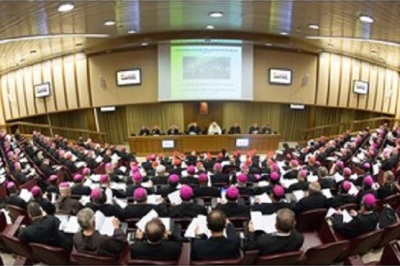Catholic bishops reject gay marriage

ROME, Italy (Christian Examiner) – Homosexuality is one of the "problems" Catholic families have to confront, but marriage is only to be between a man and a woman.
So concluded the final document of the Synod of Bishops on the Family, when just a week prior, a mid-term document indicated a far greater acceptance of the people who call themselves "gay."
The approval of divorced-and-civilly-remarried Catholics to take communion also was nixed.
The Synod of Bishops met Oct. 5-19 at the Vatican to discuss Pastoral Challenges to the Family in the Context of Evangelization. It was the first "family issues" summit since 1980. The "mid-term" report released Oct. 13 seemed to indicate the bishops would welcome unmarried couples living together, same-sex couples, divorce and artificial contraception.
On the heels of that initial report came counter-reports by bishops who disagreed with the conclusions written in the initial draft. "It's not what we're saying at all," said Cardinal Wilfrid Fox Napier of South Africa.
The final document was released Oct. 18, as the gathering was concluding, at Pope Francis' request, to ensure complete transparency, several media reported.
The 184 bishops at the conference now return to their home countries to talk with their parishioners, before convening again next year as part of a larger synod Oct. 4-25, 2015, at the Vatican. That synod's theme will be The Vocation and Mission of the Family in the Church and in the Modern World, and will make recommendations to the pope.
As Francis X. Rocca reported Sunday for Catholic News Service, "After several days of animated debate over its official midterm report, the Synod of Bishops on the family agreed on a final document more clearly grounded in traditional Catholic teaching. Yet the assembly failed to reach consensus on especially controversial questions of Communion for the divorced and civilly remarried, and the pastoral care of homosexuals."
Pope Francis' speech during the last working session, concluded with a standing ovation of more than four minutes, warned against extremism in the defense of tradition or in the pursuit of progress.
The bishops voted on each of the final document's 62 paragraphs. All received a simple majority; all but three passed with the two-thirds majority usually required for approval of such documents.
Two of the three paragraphs that didn't have a two-thirds majority related to a proposal by German Cardinal Walter Kasper that would make it easier for divorced and civilly remarried Catholics to receive communion, the Lord's Supper, which is taken during every mass.
"The document noted disagreements on the subject and recommended further study," Rocca wrote. "The document's section on homosexuality, which also fell short of supermajority approval, was significantly changed from its counterpart in the midterm report.
"The original section heading – 'welcoming homosexuals' – was changed to 'pastoral attention to persons with homosexual orientation," Rocca continued. "A statement that same-sex unions can be a 'precious support in the life of the partners' was removed."
The final report quoted a 2003 document from the Congregation for the Doctrine of the Faith, the Catholic insider noted. That document said, "There are absolutely no grounds for considering homosexual unions to be in any way similar or even remotely analogous to God's plan for marriage and family."
Vatican spokesman Tom Rosica explained that the pope asked for the document to be made public was "to show the degree of maturity that has taken place" in the discussions, according to an article produced by Vatican Radio.
"I can happily say that – with a spirit of collegiality and of synodality – we have truly lived the experience of 'Synod,' a path of solidarity, a 'journey together,'" Pope Francis said. "... And since it is a journey of human beings, with the consolations there were also moments of desolation, of tensions and temptations, of which a few possibilities could be mentioned.
"One, a temptation to hostile inflexibility .... From the time of Christ, it is the temptation of the zealous, of the scrupulous, of the solicitous and of the so-called – today – 'traditionalists' and also of the intellectuals," the pope continued. "The temptation to a destructive tendency to goodness, that in the name of a deceptive mercy binds the wounds without first curing them and treating them, that treats the symptoms and not the causes and the roots. It is the temptation of the 'do-gooders,' of the fearful, and also of the so-called 'progressives and liberals.'"
The pope also listed the temptation of transforming stones into bread, which would result in the "bread" becoming an unbearable burden; the temptation to "come down off the cross, to please the people, and not stay there, in order to fulfill the will of the Father, to bow down to a worldly spirit instead of purifying it and bending it to the Spirit of God;" and the temptation of neglecting faith and neglecting reality.
Pope Francis concluded, "Dear brothers and sisters, now we still have one year to mature, with true spiritual discernment, the proposed ideas and to find concrete solutions to so many difficulties and innumerable challenges that families must confront; to give answers to the many discouragements that surround and suffocate families."